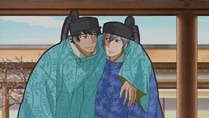![[HorribleSubs] Utakoi - 09 [720p].mkv_snapshot_03.06_[2012.08.28_15.46.39] [HorribleSubs] Utakoi - 09 [720p].mkv_snapshot_03.06_[2012.08.28_15.46.39]](https://lh5.ggpht.com/-t7Z99r2bVt0/UD1X-ZdCO9I/AAAAAAABtls/WxLUZg1v8cs/%25255BHorribleSubs%25255D%252520Utakoi%252520-%25252009%252520%25255B720p%25255D.mkv_snapshot_03.06_%25255B2012.08.28_15.46.39%25255D_thumb.jpg?imgmax=800) |
![[HorribleSubs] Utakoi - 09 [720p].mkv_snapshot_10.56_[2012.08.28_15.55.47] [HorribleSubs] Utakoi - 09 [720p].mkv_snapshot_10.56_[2012.08.28_15.55.47]](https://lh4.ggpht.com/-MUbzgHoNKEE/UD1YANeGPRI/AAAAAAABtl8/xzDJAXl85zE/%25255BHorribleSubs%25255D%252520Utakoi%252520-%25252009%252520%25255B720p%25255D.mkv_snapshot_10.56_%25255B2012.08.28_15.55.47%25255D_thumb.jpg?imgmax=800) |
![[HorribleSubs] Utakoi - 09 [720p].mkv_snapshot_21.59_[2012.08.28_16.07.21] [HorribleSubs] Utakoi - 09 [720p].mkv_snapshot_21.59_[2012.08.28_16.07.21]](https://lh5.ggpht.com/-aVDDPWLfIpM/UD1YCDJP5EI/AAAAAAABtmI/sO6T6OQVsec/%25255BHorribleSubs%25255D%252520Utakoi%252520-%25252009%252520%25255B720p%25255D.mkv_snapshot_21.59_%25255B2012.08.28_16.07.21%25255D_thumb.jpg?imgmax=800) |
For the first time we have an episode squarely focused on someone who, by his own admission, sucks at poetry.
![[HorribleSubs] Utakoi - 09 [720p].mkv_snapshot_02.15_[2012.08.28_15.45.48] [HorribleSubs] Utakoi - 09 [720p].mkv_snapshot_02.15_[2012.08.28_15.45.48]](https://lh3.ggpht.com/-3J3zHxhVGEI/UD1YD8muTnI/AAAAAAABtmc/Hs0UKSvL3WY/%25255BHorribleSubs%25255D%252520Utakoi%252520-%25252009%252520%25255B720p%25255D.mkv_snapshot_02.15_%25255B2012.08.28_15.45.48%25255D_thumb.jpg?imgmax=800) This was in many ways one of the most low-key episodes of Utakoi so far, and possibly the snarkiest. That seems fitting somehow as Sei Shounagon is a writer who was quite well known for her somewhat acid wit, and in this episode we meet the man in whom she met her match – Fujiwara no Yukinari (Takahiro Sakurai). The young (six years her junior) Head Chamberlain of the palace in many ways became a kind of alter-ego to Sei Shounagon, becoming a close friend and perhaps more, though the history books are unclear about the latter.
This was in many ways one of the most low-key episodes of Utakoi so far, and possibly the snarkiest. That seems fitting somehow as Sei Shounagon is a writer who was quite well known for her somewhat acid wit, and in this episode we meet the man in whom she met her match – Fujiwara no Yukinari (Takahiro Sakurai). The young (six years her junior) Head Chamberlain of the palace in many ways became a kind of alter-ego to Sei Shounagon, becoming a close friend and perhaps more, though the history books are unclear about the latter.
![[HorribleSubs] Utakoi - 09 [720p].mkv_snapshot_04.04_[2012.08.28_15.47.37] [HorribleSubs] Utakoi - 09 [720p].mkv_snapshot_04.04_[2012.08.28_15.47.37]](https://lh6.ggpht.com/-HNeAT2rVeDg/UD1YF2glUdI/AAAAAAABtms/IExTI_9D-1c/%25255BHorribleSubs%25255D%252520Utakoi%252520-%25252009%252520%25255B720p%25255D.mkv_snapshot_04.04_%25255B2012.08.28_15.47.37%25255D_thumb.jpg?imgmax=800) What’s clear from this episode is that Yukinari would certainly have liked to have been more than friends, and he was not a man who gave his affections lightly. Constantly encouraged by his friend Tadanobu to loosen up and be friendly with the ladies of the court, the anti-social Yukinari has eyes only for Nagiko, though she refuses to show him her face (which becomes a sort of symbolic running gag). The themes of this episode are friendship, politics and family – and these two share similar views on all three. He declares he would “rather have one friend for life than a thousand casual acquaintances”, and they share a disdain on those who trade on their parents’ name, or trade their friendship for social advantage. Their shared cynicism is oddly idealistic and romantic, in its way.
What’s clear from this episode is that Yukinari would certainly have liked to have been more than friends, and he was not a man who gave his affections lightly. Constantly encouraged by his friend Tadanobu to loosen up and be friendly with the ladies of the court, the anti-social Yukinari has eyes only for Nagiko, though she refuses to show him her face (which becomes a sort of symbolic running gag). The themes of this episode are friendship, politics and family – and these two share similar views on all three. He declares he would “rather have one friend for life than a thousand casual acquaintances”, and they share a disdain on those who trade on their parents’ name, or trade their friendship for social advantage. Their shared cynicism is oddly idealistic and romantic, in its way.
![[HorribleSubs] Utakoi - 09 [720p].mkv_snapshot_05.19_[2012.08.28_15.48.53] [HorribleSubs] Utakoi - 09 [720p].mkv_snapshot_05.19_[2012.08.28_15.48.53]](https://lh4.ggpht.com/-oVKsZACibp4/UD1YHpWY0bI/AAAAAAABtm8/QUK1jb5FtUY/%25255BHorribleSubs%25255D%252520Utakoi%252520-%25252009%252520%25255B720p%25255D.mkv_snapshot_05.19_%25255B2012.08.28_15.48.53%25255D_thumb.jpg?imgmax=800) There’s a practical aspect to all this, and it ties into Sei Shounagon’s being the Lady-in-Waiting for the Empress Teishi, who fell out of favor and was supplanted by the Second Empress – the one for whom Nagiko’s great rival Murasaki (the author of the Tale of Genji, and someone I’m curious to meet in this series) was a Lady-in-Waiting. Yukinari doesn’t trade on Nagiko’s name when she’s in favor, and doesn’t abandon her when she’s not (even exiled from the palace for a time) but Nagiko believes a romance between them would be unwise politically and carry risks for Teishi (though Teishi encourages her to proceed anyway). It’s in this light that Nagiko composes the following poem (#62 in the Ogura Hyakunin Isshu, though it initially appeared in The Pillow Book) as part of a correspondence with Yukinari:
There’s a practical aspect to all this, and it ties into Sei Shounagon’s being the Lady-in-Waiting for the Empress Teishi, who fell out of favor and was supplanted by the Second Empress – the one for whom Nagiko’s great rival Murasaki (the author of the Tale of Genji, and someone I’m curious to meet in this series) was a Lady-in-Waiting. Yukinari doesn’t trade on Nagiko’s name when she’s in favor, and doesn’t abandon her when she’s not (even exiled from the palace for a time) but Nagiko believes a romance between them would be unwise politically and carry risks for Teishi (though Teishi encourages her to proceed anyway). It’s in this light that Nagiko composes the following poem (#62 in the Ogura Hyakunin Isshu, though it initially appeared in The Pillow Book) as part of a correspondence with Yukinari:
Sei Shounagon
Yo o komete
Tori no sorane wa
Hakaru tomoYo ni Osaka no
Seki wa yurusaji
The rooster’s crowing
In the middle of the night
Deceived the hearers;But at Osaka’s gateway
The guards are never fooled.
![[HorribleSubs] Utakoi - 09 [720p].mkv_snapshot_06.45_[2012.08.28_15.50.18] [HorribleSubs] Utakoi - 09 [720p].mkv_snapshot_06.45_[2012.08.28_15.50.18]](https://lh3.ggpht.com/-ArZZf0tQa9Q/UD1YLDYZ4oI/AAAAAAABtnM/jmd8ImkCia8/%25255BHorribleSubs%25255D%252520Utakoi%252520-%25252009%252520%25255B720p%25255D.mkv_snapshot_06.45_%25255B2012.08.28_15.50.18%25255D_thumb.jpg?imgmax=800) There are conflicting interpretations of this poem, though it’s almost universally agreed to have been written of Yukinari. Some say it describes his sneaking away from her rooms after a night of love, others that it describes his leaving after a night of conversation (when a lover might in fact have stayed, rather than worrying about leaving before the rooster crows first light). In context of the anime it’s presented as part of a correspondence that’s teasing but laced with subtext, a response to Yukinari’s finally declaring his intentions for Nagiko more or less openly. It remains to be seen whether the anime will pursue this relationship further, but the next episode looks to focus on Kinto, the close friend of Sanekata (the man Nagiko loved – and he her – who by his leaving more or less forced Nagiko to accept her position in Teishi’s court).
There are conflicting interpretations of this poem, though it’s almost universally agreed to have been written of Yukinari. Some say it describes his sneaking away from her rooms after a night of love, others that it describes his leaving after a night of conversation (when a lover might in fact have stayed, rather than worrying about leaving before the rooster crows first light). In context of the anime it’s presented as part of a correspondence that’s teasing but laced with subtext, a response to Yukinari’s finally declaring his intentions for Nagiko more or less openly. It remains to be seen whether the anime will pursue this relationship further, but the next episode looks to focus on Kinto, the close friend of Sanekata (the man Nagiko loved – and he her – who by his leaving more or less forced Nagiko to accept her position in Teishi’s court).
![[HorribleSubs] Utakoi - 09 [720p].mkv_snapshot_08.06_[2012.08.28_15.51.40] [HorribleSubs] Utakoi - 09 [720p].mkv_snapshot_08.06_[2012.08.28_15.51.40]](https://lh6.ggpht.com/-odc0hujpZig/UD1YNAWYxBI/AAAAAAABtnc/4In8uY3OozM/%25255BHorribleSubs%25255D%252520Utakoi%252520-%25252009%252520%25255B720p%25255D.mkv_snapshot_08.06_%25255B2012.08.28_15.51.40%25255D_thumb.jpg?imgmax=800) |
![[HorribleSubs] Utakoi - 09 [720p].mkv_snapshot_08.13_[2012.08.28_15.51.47] [HorribleSubs] Utakoi - 09 [720p].mkv_snapshot_08.13_[2012.08.28_15.51.47]](https://lh5.ggpht.com/-X07NC3jaJH0/UD1YOwMI3wI/AAAAAAABtns/fBSmI25Rlrk/%25255BHorribleSubs%25255D%252520Utakoi%252520-%25252009%252520%25255B720p%25255D.mkv_snapshot_08.13_%25255B2012.08.28_15.51.47%25255D_thumb.jpg?imgmax=800) |
![[HorribleSubs] Utakoi - 09 [720p].mkv_snapshot_11.29_[2012.08.28_15.56.21] [HorribleSubs] Utakoi - 09 [720p].mkv_snapshot_11.29_[2012.08.28_15.56.21]](https://lh6.ggpht.com/-DVkL0FaiW0I/UD1YRuJq7AI/AAAAAAABtn8/sO7tazdmyX4/%25255BHorribleSubs%25255D%252520Utakoi%252520-%25252009%252520%25255B720p%25255D.mkv_snapshot_11.29_%25255B2012.08.28_15.56.21%25255D_thumb.jpg?imgmax=800) |
![[HorribleSubs] Utakoi - 09 [720p].mkv_snapshot_13.38_[2012.08.28_15.58.30] [HorribleSubs] Utakoi - 09 [720p].mkv_snapshot_13.38_[2012.08.28_15.58.30]](https://lh6.ggpht.com/-i9iM_gsvhTg/UD1YTjkafhI/AAAAAAABtoM/4UNboXZd8cw/%25255BHorribleSubs%25255D%252520Utakoi%252520-%25252009%252520%25255B720p%25255D.mkv_snapshot_13.38_%25255B2012.08.28_15.58.30%25255D_thumb.jpg?imgmax=800) |
![[HorribleSubs] Utakoi - 09 [720p].mkv_snapshot_14.20_[2012.08.28_15.59.11] [HorribleSubs] Utakoi - 09 [720p].mkv_snapshot_14.20_[2012.08.28_15.59.11]](https://lh3.ggpht.com/-w092GRMATyU/UD1YWAPhCmI/AAAAAAABtoc/DTbK9bVje9E/%25255BHorribleSubs%25255D%252520Utakoi%252520-%25252009%252520%25255B720p%25255D.mkv_snapshot_14.20_%25255B2012.08.28_15.59.11%25255D_thumb.jpg?imgmax=800) |
![[HorribleSubs] Utakoi - 09 [720p].mkv_snapshot_15.56_[2012.08.28_16.00.48] [HorribleSubs] Utakoi - 09 [720p].mkv_snapshot_15.56_[2012.08.28_16.00.48]](https://lh6.ggpht.com/-R5Z53cA24zE/UD1YX1vFGyI/AAAAAAABtos/nacC0CibsiU/%25255BHorribleSubs%25255D%252520Utakoi%252520-%25252009%252520%25255B720p%25255D.mkv_snapshot_15.56_%25255B2012.08.28_16.00.48%25255D_thumb.jpg?imgmax=800) |
![[HorribleSubs] Utakoi - 09 [720p].mkv_snapshot_16.55_[2012.08.28_16.02.17] [HorribleSubs] Utakoi - 09 [720p].mkv_snapshot_16.55_[2012.08.28_16.02.17]](https://lh4.ggpht.com/-n37XCXou81g/UD1YZ3hbBpI/AAAAAAABto8/I3Jg5nBTQQM/%25255BHorribleSubs%25255D%252520Utakoi%252520-%25252009%252520%25255B720p%25255D.mkv_snapshot_16.55_%25255B2012.08.28_16.02.17%25255D_thumb.jpg?imgmax=800) |
![[HorribleSubs] Utakoi - 09 [720p].mkv_snapshot_17.42_[2012.08.28_16.03.04] [HorribleSubs] Utakoi - 09 [720p].mkv_snapshot_17.42_[2012.08.28_16.03.04]](https://lh3.ggpht.com/-OhygmbzLTUo/UD1Ybud71vI/AAAAAAABtpM/Qti-E8icYcw/%25255BHorribleSubs%25255D%252520Utakoi%252520-%25252009%252520%25255B720p%25255D.mkv_snapshot_17.42_%25255B2012.08.28_16.03.04%25255D_thumb.jpg?imgmax=800) |
![[HorribleSubs] Utakoi - 09 [720p].mkv_snapshot_18.19_[2012.08.28_16.03.41] [HorribleSubs] Utakoi - 09 [720p].mkv_snapshot_18.19_[2012.08.28_16.03.41]](https://lh3.ggpht.com/--deKc4kqEeI/UD1Yd7pC6CI/AAAAAAABtpc/Asw6JJ6C0M4/%25255BHorribleSubs%25255D%252520Utakoi%252520-%25252009%252520%25255B720p%25255D.mkv_snapshot_18.19_%25255B2012.08.28_16.03.41%25255D_thumb.jpg?imgmax=800) |
![[HorribleSubs] Utakoi - 09 [720p].mkv_snapshot_18.41_[2012.08.28_16.04.03] [HorribleSubs] Utakoi - 09 [720p].mkv_snapshot_18.41_[2012.08.28_16.04.03]](https://lh5.ggpht.com/-WrYi1ClNYWI/UD1Ygze8NYI/AAAAAAABtps/BFAGzT2BiPU/%25255BHorribleSubs%25255D%252520Utakoi%252520-%25252009%252520%25255B720p%25255D.mkv_snapshot_18.41_%25255B2012.08.28_16.04.03%25255D_thumb.jpg?imgmax=800) |
![[HorribleSubs] Utakoi - 09 [720p].mkv_snapshot_19.23_[2012.08.28_16.04.45] [HorribleSubs] Utakoi - 09 [720p].mkv_snapshot_19.23_[2012.08.28_16.04.45]](https://lh6.ggpht.com/-4rHsPg68GZE/UD1Yj5CNlZI/AAAAAAABtp8/j-88wlG2838/%25255BHorribleSubs%25255D%252520Utakoi%252520-%25252009%252520%25255B720p%25255D.mkv_snapshot_19.23_%25255B2012.08.28_16.04.45%25255D_thumb.jpg?imgmax=800) |
![[HorribleSubs] Utakoi - 09 [720p].mkv_snapshot_20.00_[2012.08.28_16.05.22] [HorribleSubs] Utakoi - 09 [720p].mkv_snapshot_20.00_[2012.08.28_16.05.22]](https://lh6.ggpht.com/-aWj5RGYRDU8/UD1Yls0-QSI/AAAAAAABtqM/SREBun2Ud5U/%25255BHorribleSubs%25255D%252520Utakoi%252520-%25252009%252520%25255B720p%25255D.mkv_snapshot_20.00_%25255B2012.08.28_16.05.22%25255D_thumb.jpg?imgmax=800) |





Highway
August 30, 2012 at 2:19 pmI don't know why, but I really liked the inclusion of Empress Teishi in this episode. Even in the small amount of time she was shown, she was portrayed as someone who cared for Nagiko, and encouraged her emotions and friendships with Yukinari, even if there was the possibility of it making trouble for her, and as Nagiko dismissed the idea for the very same reason.
I really know nothing of this history, nor the poetry (and honestly, don't even find the poetry part very interesting, except as a Macguffin for the storytelling), but I've consistently liked the way the stories have been told, the way the personal interactions have been fleshed out, and they way the stories of the different characters interconnect.
admin
August 30, 2012 at 4:29 pmWell, it's pretty rare for us to see Imperial figures depicted as actual people with actual personalities in series like this. Usually they're like dark matter – they effect everything, but we can't see them.
Highway
August 30, 2012 at 4:59 pmYes, that's something that I think it's helpful to remember most of the time. People in positions of power are somewhat enigmatic and mysterious, but they are generally people too. Although, maybe if people weren't so surprised at that notion, we could do away with so much of the "cult of famousness" stuff that is popular culture.